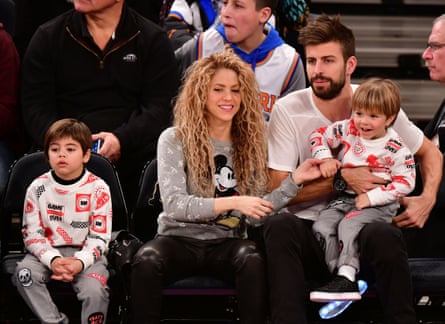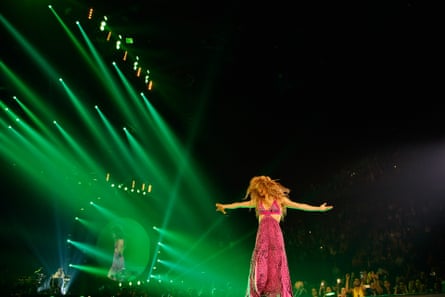There was a time, in late 2017, when Shakira thought she might never sing again. After suffering a haemorrhage in her vocal cords, she could barely speak. “I always thought there were going to be things in my life that would go away, like beauty, youth, all of that stuff,” she says. “But I never thought that my voice would leave me, because it’s so inherent to my nature. It was my identity. So when I couldn’t sing, that was unbearable. There were times I couldn’t even get out of bed – I was so depressed.”
There’s something almost fairytale-like about this: a cautionary fable about the danger of taking happiness for granted, starring the Colombian singer who sold a reported 75m records and became one of the richest women in pop. To give her voice the best chance to recover, there were periods when Shakira wouldn’t speak at all. “I had to communicate through signs and nobody could understand me.”
Her children – then two and four – couldn’t read, so writing didn’t help. She says she never fought with her partner, the Barcelona defender Gerard Piqué, so much as when she couldn’t speak. “He jokes that you would think you would want your wife to shut up – but when I had to remain quiet, he felt like one of those ex-convicts who are given their freedom and don’t know what to do with it.” How did she stay positive? “I was not positive. I was so pessimistic. I was a bitter person to be around.” She laughs. “Gerard saw the worst of me.”
Doctors told her she needed surgery, but she wasn’t convinced it would work. Instead she tried hypnosis and meditation, even going to Lourdes to get holy water. “Either I needed surgery or divine intervention.” When her voice eventually returned, without an operation, “it felt like I was having some kind of religious experience”. On her El Dorado tour, which she’d been forced to postpone, every night on stage was “a gift”.
A film of the tour is about to be released, which is why we’re meeting in a hotel suite in Barcelona, by the window in the late afternoon, a darkening sky outside. Shakira sits cross-legged and tiny in a giant armchair, eating gummy sweets. A publicist is somewhere across the room in the shadows.
There is a palpable joy to Shakira’s concert performances, filmed mostly at her Los Angeles show in August last year. She dances in sparkly fishnet leggings, her voice filling the stadium as she sings such Spanish-language favourites as Chantaje and her English-language crossover hits, including Whenever, Wherever and She Wolf. She thinks the experience has made her a better singer. “You go out in search of affirmation that you’re good, that people like you. But this time it was different – I was out there because I wanted to feel the pleasure of singing.”
In February, Shakira will perform with Jennifer Lopez at the Super Bowl half-time show, viewed as a career high for many artists. At least it was until 2016 and the NFL’s treatment of the San Francisco 49ers quarterback Colin Kaepernick, who had started kneeling during the national anthem in protest at racial inequality and police brutality. Many artists, in solidarity with Kaepernick, reportedly turned down the chance to perform at half-time. Did his protest have any impact on her decision to take to the stage? She looks down. “Well, you know, I think it’s the right thing to do for the Latino community because we’ve also been through so much in Trump’s America, with walls being built and …” She doesn’t finish the sentence. “It’s an opportunity to celebrate our culture, you know?”
Why has Latin pop become so big? “Well, it was about time,” says Shakira. Now 42, she wrote her first songs at just eight and recorded her first album, Magia, at 13. “When I started, Colombia had a nonexistent pop scene. I had to overcome so many obstacles to become an international pop singer. Later on, even when I crossed over to the Anglo-American market, I had to fight my own record company to put out music like Hips Don’t Lie. My music always had some kind of fusion – Colombian and Middle Eastern influences, so it made my path even harder.”
She lives in Barcelona with Piqué and their two sons. This tour is her first as a mother. “I had no idea how this was going to feel,” she says. “At some points, I thought it was going to be impossible. My kids were so little, running around amok.” She tried to arrange the dates so they would coincide with school holidays and they could be with her, but other times they stayed at home with Piqué. “Those separation periods were hard.”

Being a mother, she says, “is the hardest job I’ve ever done. I’m never sure if I’m doing it right. I’m always second-guessing myself. I love being a mother but it’s challenging to keep the balance – to not let motherhood prevent you from reading a good book, going out with your boyfriend-slash-husband, having an adult conversation.” Has it affected her creativity? “It could if you don’t protect and defend that space.”
Her children attended her show for the first time and saw their mother perform to tens of thousands of emotional fans. In the film, there is footage of her sons with their father, watching Shakira and looking a little bewildered. It must have blown their little minds. “Yeah, I think a little too much. I’m trying to give them some normalcy and that’s one of the hardest things, because we’re not normal. At least, we are normal people but our lives are very unnatural in a way. We try to hide all the unnatural things and pretend we’re a regular family.”
It’s a “work in progress”, she says. “I don’t want to overload them with every single detail of my career, or every victory. I’m more interested in them learning about the obstacles, my difficulties and their dad’s. They weren’t born when I was back in Colombia and every single door was shut in my face. Those are the stories I want to tell them because life isn’t always easy. Not everything happens as you planned.”
Shakira Isabel Mebarak Ripoll grew up in Barranquilla, on the coast of northern Colombia. Her father, who is Lebanese but grew up in Colombia, ran a successful jewellery business until he went bankrupt when Shakira was a child. She and her mother went to stay in the US for a while and, when they returned, her father had sold everything, including their furniture, to pay debts. Though largely insulated from the country’s decades-long armed conflict, she was still “very aware” of it. “When you’re born in a country where there is huge social strife, and a few people have a lot and a lot of people have nothing, you grow up intolerant to that inequality.”
Every Friday, her Catholic school would send its students into poor neighbourhoods to teach other children how to read and write. “It was almost an impossible task. They were barefoot, shirtless in the sun. There were no proper resources or infrastructure. It was so unfair that some kids were able to go school and university, but for others that wasn’t an option. I had to succeed, make money, become someone relevant in society, because I felt that only that way could I do something.”
When her third album – Pies Descalzos (Barefoot) – was a hit, Shakira taught herself English, released the crossover album Laundry Service and became an international star. She also started the Pies Descalzos Foundation, which opens and funds schools in Colombia. She has since campaigned for education on the global stage, advised committees and presidents – and formed an unlikely friendship with the former British prime minister Gordon Brown.
Her reputation as an activist and philanthropist took a hit this summer when she appeared in court in Spain answering allegations that she had avoided €14.5m in taxes. A statement released at the time said the singer had paid all tax due, and the issue was about when she had become resident in Spain (previously, she had been resident in the Bahamas; in 2017, she was also named in the Paradise Papers, the investigation into offshore finances). But she won’t talk about any of this, says her PR, because of the legal issues involved.

The film portrays her as fiercely determined, with laser-focused knowledge of what she wants. “I am very structured and I make the rules,” she says at one point, sitting on a private jet, travelling between shows, “and I don’t allow myself to fail.” That sounds exhausting, I say, and she laughs. “I don’t remember saying that, but maybe – I say so many things. Actually, with time I’ve learned that you have to allow yourself to make mistakes. I guess we all have a little fear of failure – we were trained that way – but it’s true, it’s an exhausting way of living.” Does she still have a fear of failure? “Of course. But I fear other things a lot more. I fear for my family’s health, their wellbeing. There are things that are much more important than personal and professional success.”
That doesn’t mean she’s ready to take her foot off the gas. “I want to continue growing and continue being an interesting lady. There are so many other things that I still want to achieve.” Such as? “Like one day waking up on a farm and being able to just mow the lawn, and milk some cows. One day I want to have a farm life. I don’t think I could ever be bored of being in nature. Eat all I want. Sometimes I think there’s going to be more to life than my actual life.”
She smiles, not entirely serious. I don’t believe her anyway. There is a shot of her at the end of her concert, a tiny tornado, all wild hair and pink leopard-print, performing an inhuman leap. She looks as if she couldn’t be anywhere else.

Comments (…)
Sign in or create your Guardian account to join the discussion